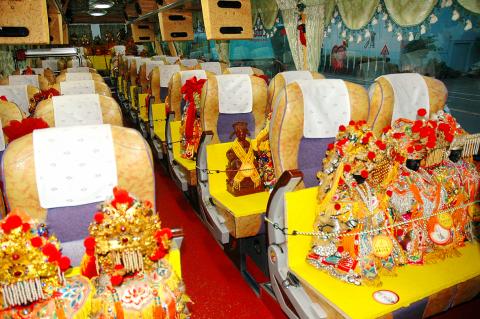Devotees of the deity Matsu on Monday marked the goddess’ 1,051st birthday by treating 100 Matsu statues to a nationwide tour via long-haul buses.
“It’s so interesting,” said many people who witnessed the scenario, in which Matsu statues took up all passenger seats on the buses.
“The driver of this Mastu bus is very lucky,” said Central Election Commission Chairperson Chang Po-ya (張博雅), who presided over a fireworks ceremony.

Photo: Yu Hsueh-lan, Taipei Times
Bus driver Huang Chi-jung (黃啟榮) agreed, saying he considered himself very lucky “because the blessing by Matsu will last all year.”
Chiayi City’s Tianxuangong Temple chairman Teng Chin-tien (鄧慶田), whose temple was in charge of hosting the event, said it was the first Matsu pilgrimage to travel around the nation.
One hundred statues participated in the event to coincide with the celebration of the Republic of China’s (ROC) centennial this year, he said, adding that he hoped the event could promote the goodwill of Matsu in saving all living beings, good weather and a prosperous and peaceful future.
There was a gathering of 323 worshipers to represent Matsu’s birthday on the 23rd day of the third month of the lunar calendar that accompanied the statues on eight buses. The bus trip will head north from Chiayi and visit 46 temples along the way. It is scheduled to return in the afternoon on Saturday.
On the bus, every two seats carried three statues seated in specially made cloth-covered wooden boxes and fastened by seatbelts to prevent them from dropping to the floor when the buses turn. One driver and one tour guide are the only people to serve the statues on each bus.
Ethnologist Lin Mao-hsien (林茂賢) said most gods have regional borders. Traveling within the region is called a pilgrimage (遶境), while crossing borders is called a meeting (會香) or visiting (進香), he said.
Lin said that in the past, statues of gods were carried by men, but as times change, modes of -transportation have also improved. Now statues not only travel by car or bus, he said, but also by plane as religious culture flows between Taiwan and China.

The Ministry of Economic Affairs has fined Taobao NT$1.2 million (US$36,912) for advertisements that exceed its approved business scope, requiring the Chinese e-commerce platform to make corrections in the first half of this year or its license may be revoked. Lawmakers have called for stricter enforcement of Chinese e-commerce platforms and measures to prevent China from laundering its goods through Taiwan in response to US President Donald Trump’s heavy tariffs on China. The Legislative Yuan’s Finance Committee met today to discuss policies to prevent China from dumping goods in Taiwan, inviting government agencies to report. Democratic Progressive Party Legislator Kuo Kuo-wen (郭國文) said

The Ministry of Economic Affairs has fined Taobao NT$1.2 million (US$36,900) for advertisements that exceeded its approved business scope and ordered the Chinese e-commerce platform to make corrections in the first half of this year or its license would be revoked. Lawmakers have called for stricter supervision of Chinese e-commerce platforms and more stringent measures to prevent China from laundering its goods through Taiwan as US President Donald Trump’s administration cracks down on origin laundering. The legislature’s Finance Committee yesterday met to discuss policies to prevent China from dumping goods in Taiwan, inviting government agencies to report on the matter. Democratic Progressive Party

Taiwan and its Pacific ally Tuvalu on Tuesday signed two accords aimed at facilitating bilateral cooperation on labor affairs, according to Taiwan’s Ministry of Foreign Affairs (MOFA). The governments inked two agreements in Taipei, witnessed by Foreign Minister Lin Chia-lung (林佳龍) and visiting Deputy Tuvaluan Prime Minister Panapasi Nelesone, MOFA said in a news release. According to MOFA, the agreements will facilitate cooperation on labor issues and allow the two sides to mutually recognize seafarers’ certificates and related training. Taiwan would also continue to collaborate with Tuvalu across various fields to promote economic prosperity as well as the well-being of their

Sung Chien-liang (宋建樑), who led efforts to recall Democratic Progressive Party (DPP) Legislator Lee Kun-cheng (李坤城), was released on bail of NT$80,000 today amid outcry over his decision to wear a Nazi armband to questioning the night before. Sung arrived at the New Taipei District Prosecutors’ Office for questioning in a recall petition forgery case last night wearing a red armband bearing a swastika, carrying a copy of Adolf Hitler’s Mein Kampf and giving a Nazi salute. Sung left the building at 1:15am without the armband and covering the book with his coat. Lee said today that this is a serious